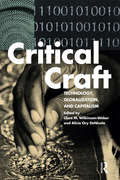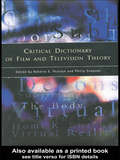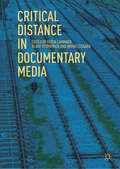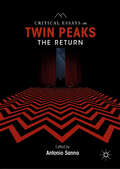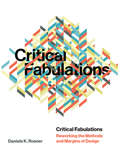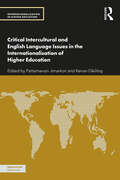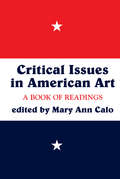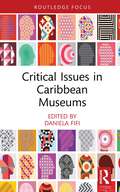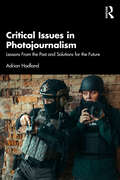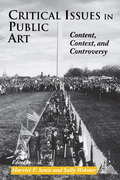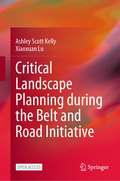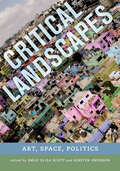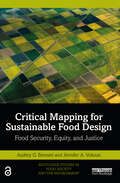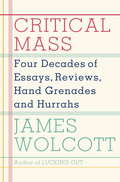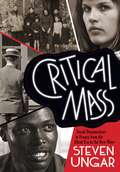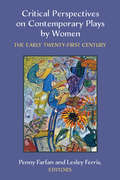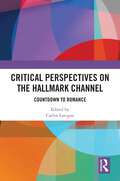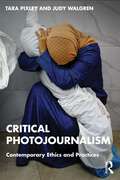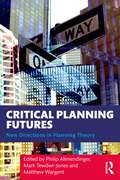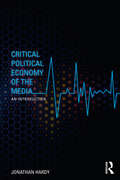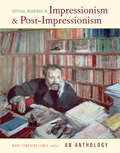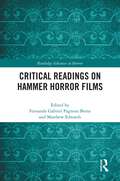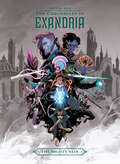- Table View
- List View
Critical Craft: Technology, Globalization, and Capitalism (Criminal Practice Ser.)
by Clare M. Wilkinson-Weber Alicia Ory DenicolaFrom Oaxacan wood carvings to dessert kitchens in provincial France, Critical Craft presents thirteen ethnographies which examine what defines and makes ‘craft’ in a wide variety of practices from around the world. Challenging the conventional understanding of craft as a survival, a revival, or something that resists capitalism, the book turns instead to the designers, DIY enthusiasts, traditional artisans, and technical programmers who consider their labor to be craft, in order to comprehend how they make sense of it. The authors’ ethnographic studies focus on the individuals and communities who claim a practice as their own, bypassing the question of craft survival to ask how and why activities termed craft are mobilized and reproduced. Moving beyond regional studies of heritage artisanship, the authors suggest that ideas of craft are by definition part of a larger cosmopolitan dialogue of power and identity. By paying careful attention to these sometimes conflicting voices, this collection shows that there is great flexibility in terms of which activities are labelled ‘craft’. In fact, there are many related ideas of craft and these shape distinct engagements with materials, people, and the economy. Case studies from countries including Mexico, Nigeria, India, Taiwan, the Philippines, and France draw together evidence based on linguistics, microsociology, and participant observation to explore the shifting terrain on which those engaged in craft are operating. What emerges is a fascinating picture which shows how claims about craft are an integral part of contemporary global change.
Critical Dictionary of Film and Television Theory
by Philip Simpson Roberta E. PearsonThe Critical Dictionary of Film and Television Theory clearly and accessibly explains the major theoretical approaches now deployed in the study of the moving image, as well as defining key theoretical terms.This dictionary provides readers with the conceptual apparatus to understand the often daunting language and terminology of screen studies. Entries include: *audience * Homi K. Bhabha * black cinema * the body * children and media * commodification * cop shows * deep focus * Umberto Eco * the gaze * Donna Haraway * bell hooks * infotainment * master narrative * medical dramas * morpheme * myth * panopticon * pastiche * pleasure * real time * social realism * sponsorship * sport on television * subliminal * third cinema * virtual realityConsultant Editors:David Black, USA, William Urricchio, University of Utrecht, The Netherlands, Gill Branston, Cardiff University, UK ,Elayne Rapping, USA
Critical Distance in Documentary Media
by Gerda Cammaer Bruno Lessard Blake FitzpatrickThis collection of essays presents new formulations of ideas and practices within documentary media that respond critically to the multifaceted challenges of our age. As social media, augmented reality, and interactive technologies play an increasing role in the documentary landscape, new theorizations are needed to account for how such media both represents recent political, socio-historical, environmental, and representational shifts, and challenges the predominant approaches by promoting new critical sensibilities. The contributions to this volume approach the idea of “critical distance” in a documentary context and in subjects as diverse as documentary exhibitions, night photography, drone imagery, installation art, mobile media, nonhuman creative practices, sound art and interactive technologies. It is essential reading for scholars, practitioners and students working in fields such as documentary studies, film studies, cultural studies, contemporary art history and digital media studies.
Critical Essays on Twin Peaks: The Return
by Antonio SannaThis edited collection offers an interdisciplinary study of Twin Peaks: The Return, the third season of a TV program that has attracted the attention (and appreciation) of spectators, fans, and critics for over two decades. The book takes readers into several distinct areas and addresses the different approaches and the range of topics invited by the multidimensionality of the subject itself: the philosophical, the artistic, the socio-cultural, and the personal. The eighteen chapters constituting the volume are academic in their approach to the subject and in their methodology, whether they apply a historical, psychoanalytical, film studies, or gender studies perspective to the text under examination. The variety and range of perspectives in these aforementioned chapters reflect the belief that a study of the full complexity of Twin Peaks: The Return, as well as a timely assessment of the critical importance of the program, requires both an interdisciplinary perspective and the fusion of different intellectual approaches across genres. The chapters demonstrate a collective awareness of the TV series as a fundamental milestone in contemporary culture.
Critical Fabulations: Reworking the Methods and Margins of Design (Design Thinking, Design Theory)
by Daniela K RosnerA proposal to redefine design in a way that not only challenges the field's dominant paradigms but also changes the practice of design itself.In Critical Fabulations, Daniela Rosner proposes redefining design as investigative and activist, personal and culturally situated, responsive and responsible. Challenging the field's dominant paradigms and reinterpreting its history, Rosner wants to change the way we historicize the practice, reworking it from the inside. Focusing on the development of computational systems, she takes on powerful narratives of innovation and technology shaped by the professional expertise that has become integral to the field's mounting status within the new industrial economy. To do so, she intervenes in legacies of design, expanding what is considered “design” to include long-silenced narratives of practice, and enhancing existing design methodologies based on these rediscovered inheritances. Drawing on discourses of feminist technoscience, she examines craftwork's contributions to computing innovation—how craftwork becomes hardware manufacturing, and how hardware manufacturing becomes craftwork. She reclaims, for example, NASA's “Little Old Ladies,” the women who built information storage for the Apollo missions by weaving wires through magnetized metal rings.Mixing history, theory, personal experience, and case studies, Rosner reweaves fibers of technoscience by slowly reworking the methods and margins of design. She suggests critical fabulations as ways of telling stories that awaken alternative histories, and offers a set of techniques and orientations for fabulating its future. Critical Fabulations shows how design's hidden inheritances open different possibilities for practice.
Critical Intercultural and English Language Issues in the Internationalisation of Higher Education (Internationalization in Higher Education Series)
by Kenan Dikilitaş Pattamawan JimarkonInternationalisation is key to a modern and diverse higher education. Closely related to this is the successful integration of different cultures and languages. This book explores the dynamic relationships between English as a Lingua Franca (ELF), intercultural communication competence (ICC), internationalisation, and the use of the English language in international higher education.Featuring contributions from authors from Türkiye, Slovenia, Thailand, Taiwan and Norway, the chapters discuss topics such as translanguaging, language-related policies in internationalisation, issues of language and interculturality from a contextual point of view of pedagogy, and provide critical reflections on perceptions and orientations in support of higher education internationalisation. Ultimately, the book provides a comprehensive understanding of how the English language functions as a tool for intercultural engagement in academic settings, and the ways in which it is encountered and perceived by researchers, leaders, and practitioners.This book will be valuable reading for applied linguists, teacher educators and researchers, and graduate students in higher education involved in internationalised higher education through teaching, projects and activities.
Critical Issues In American Art: A Book Of Readings
by Mary Ann CaloThis anthology of essays on different critical approaches and methodologies for the analysis and interpretation of American art and artists is designed for students and teachers in American art history and American studies programs. It contains twenty selections from academic journals on American art from colonial times to 1940. Mary Ann Calo provides an introduction to the anthology, explaining its purpose and organization, and each selection has a brief introduction about its main focus and scholarly approach. These case studies show the diversity of scholarly thinking about interpreting American works of art, which should be useful for teachers and comprehensible and interesting for students.This anthology contains twenty articles on American art from colonial times to 1940. The selections are mainly from academic journals and aim to provide the student and teacher with different critical approaches and methodologies for the analysis and interpretation of American art and artists. Mary Ann Calo's preface to the anthology explains its purpose and organization, and each article will have a brief introduction about its main focus and scholarly approach.This text meets the need in American art history studies for an anthology of essays on critical approaches and methodologies.
Critical Issues in Caribbean Museums
by Daniela FifiCritical Issues in Caribbean Museums examines the challenges faced within the field of Caribbean Museology. Museums are sites of heritage management and, within Caribbean contexts, essential spaces for the examination of postcolonial relationships to past disenfranchisement.This book helps to identify strategies within museology that can inspire meaningful collective engagement with these histories. In the process, it also identifies the hurdles museums in the Caribbean face when telling stories of ancestral oppression. Each chapter presents a new case study, written by five museum professionals and scholars fundamentally shaping conversations on cultural heritage spaces within the Caribbean and the diaspora of Caribbean nations. Using their observations this book coalesces an understanding of the specific limitations Caribbean cultural heritage spaces face and deploys new strategies for maximising their engagement potential.Critical Issues in Caribbean Museums is written for Museum Studies researchers and museum practitioners, especially those actively engaged in the process of preserving Caribbean cultural heritage, advancing museum development in the Caribbean or in other nations for future generations.
Critical Issues in Photojournalism: Lessons From the Past and Solutions for the Future
by Adrian HadlandDrawing on original research and industry experience, this book studies the historical debates and controversies underpinning photojournalism and those practising it today.Beginning with the origins of photography and the close-knit relationship between journalism and the image, this book goes on to consider the theories that have sought to unpick photography and photojournalism and how these translate to contemporary practice. Hadland examines the present and potential roles of photojournalism in society and reflects on how technological advances such as Artificial Intelligence may impact the profession. Ethical considerations and certain immeasurable dimensions of photography, including concepts of power, truth, and meaning, are brought into question alongside ongoing issues of exclusion and homogeneity amongst professional photojournalists.Critical Issues in Photojournalism is an ideal primer for students seeking a solid historical, ethical, and reflective understanding of the discipline.
Critical Issues in Public Art
by Harriet SenieIn this groundbreaking anthology, twenty-two artists, architects, historians, critics, curators, and philosophers explore the role of public art in creating a national identity, contending that each work can only be understood by analyzing the context in which it is commissioned, built, and received. They emphasize the historical continuum between traditional works such as Mount Rushmore, the Washington Monument, and the New York Public Library lions, in addition to contemporary memorials such as the Vietnam Veterans Memorial and the Names Project AIDS Quilt. They discuss the influence of patronage on form and content, isolate the factors that precipitate controversy, and show how public art overtly and covertly conveys civic values and national culture.Complete with an updated introduction, Critical Issues in Public Art shows how monuments, murals, memorials, and sculptures in public places are complex cultural achievements that must speak to increasingly diverse groups.
Critical Landscape Planning during the Belt and Road Initiative
by Ashley Scott Kelly Xiaoxuan LuThis open access book traces the development of landscapes along the 414-kilometer China–Laos Railway, one of the first infrastructure projects implemented under China’s Belt and Road Initiative (BRI) and which is due for completion at the end of 2021. Written from the perspective of landscape architecture and intended for planners and related professionals engaged in the development and conservation of these landscapes, this book provides history, planning pedagogy and interdisciplinary framing for working alongside the often-opaque planning, design and implementation processes of large-scale infrastructure. It complicates simplistic notions of development and urbanization frequently reproduced in the Laos–China frontier region. Many of the projects and sites investigated in this book are recent “firsts” in Laos: Laos’s first wildlife sanctuary for trafficked endangered species, its first botanical garden and its first planting plan for a community forest. Most often the agents and accomplices of neoliberal development, the planning and design professions, including landscape architecture, have little dialogue with either the mainstream natural sciences or critical social sciences that form the discourse of projects in Laos and comparable contexts. Covering diverse conceptions and issues of development, including cultural and scientific knowledge exchanges between Laos and China, nature tourism, connectivity and new town planning, this book also features nine planning proposals for Laos generated through this research initiative since the railway's groundbreaking in 2016. Each proposal promotes a wider "landscape approach" to development and deploys landscape architecture’s spatial and ecological acumen to synthesize critical development studies with the planner's capacity, if not naive predilection, to intervene on the ground. Ultimately, this book advocates the cautious engagement of the professionally oriented built-environment disciplines, such as regional planning, civil engineering and landscape architecture, with the landscapes of development institutions and environmental NGOs.
Critical Landscapes: Art, Space, Politics
by Emily Eliza Scott and Kirsten SwensonFrom Francis Alÿs and Ursula Biemann to Vivan Sundaram, Allora & Calzadilla, and the Center for Urban Pedagogy, some of the most compelling artists today are engaging with the politics of land use, including the growth of the global economy, climate change, sustainability, Occupy movements, and the privatization of public space. Their work pivots around a set of evolving questions: In what ways is land, formed over the course of geological time, also contemporary and formed by the conditions of the present? How might art contribute to the expansion of spatial and environmental justice? Editors Emily Eliza Scott and Kirsten Swenson bring together a range of international voices and artworks to illuminate this critical mass of practices. One of the first comprehensive treatments of land use in contemporary art, Critical Landscapes skillfully surveys the stakes and concerns of recent land-based practices, outlining the art historical contexts, methodological strategies, and geopolitical phenomena. This cross-disciplinary collection is destined to be an essential reference not only within the fields of art and art history, but also across those of cultural geography, architecture and urban planning, environmental history, and landscape studies.
Critical Mapping for Sustainable Food Design: Food Security, Equity, and Justice (Routledge Studies in Food, Society and the Environment)
by Audrey G. Bennett Jennifer A. VokounThis book introduces critical mapping as a problematizing, reflective approach for analyzing systemic societal problems like food, scoping out existing solutions, and finding opportunities for sustainable design intervention. This book puts forth a framework entitled "wicked solutions" that can be applied to determine issues that designers should address to make real differences in the world and yield sustainable change. The book assesses the current role of design in attaining food security in a sustainable, equitable, and just manner. Accomplishing this goal is not simple; if it was, it would not be called a wicked problem. But this book shows how a particular repertoire of design tools can be deployed to find solutions and strategize the development of novel outcomes within a complex and interconnected terrain. To address the wicked problem of food insecurity, inequity, and injustice, this book highlights 73 peer-reviewed design outcomes that epitomize sustainable food design. This includes local and regional sustainable design outcomes funded or supported by public or private institutions and local and widespread design outcomes created by citizens. In doing so, this book sets the stage for an evidence-driven and evidence-informed design future that facilitates the designers’ visualization of wicked solutions to complex social problems, such as food insecurity. Drawing on an array of case studies from across the world, from urban rooftop farms and community cookers to mobile apps and food design cards, this book provides vitally important information about existing sustainable food design outcomes in a way that is organized, accessible, and informative. This book will be of great interest to academics and professionals working in the field of design and sustainable food systems. Students interested in learning about food and sustainability from across design studies, food studies, innovation and entrepreneurship, urban studies, and global development will also find this book of great use.
Critical Mapping for Sustainable Food Design: Food Security, Equity, and Justice (Routledge Studies in Food, Society and the Environment)
by Audrey G. Bennett Jennifer A. VokounThis book introduces critical mapping as a problematizing, reflective approach for analyzing systemic societal problems like food, scoping out existing solutions, and finding opportunities for sustainable design intervention.This book puts forth a framework entitled "wicked solutions" that can be applied to determine issues that designers should address to make real differences in the world and yield sustainable change. The book assesses the current role of design in attaining food security in a sustainable, equitable, and just manner. Accomplishing this goal is not simple; if it was, it would not be called a wicked problem. But this book shows how a particular repertoire of design tools can be deployed to find solutions and strategize the development of novel outcomes within a complex and interconnected terrain. To address the wicked problem of food insecurity, inequity, and injustice, this book highlights 73 peer-reviewed design outcomes that epitomize sustainable food design. This includes local and regional sustainable design outcomes funded or supported by public or private institutions and local and widespread design outcomes created by citizens. In doing so, this book sets the stage for an evidence-driven and evidence-informed design future that facilitates the designers’ visualization of wicked solutions to complex social problems, such as food insecurity. Drawing on an array of case studies from across the world, from urban rooftop farms and community cookers to mobile apps and food design cards, this book provides vitally important information about existing sustainable food design outcomes in a way that is organized, accessible, and informative.This book will be of great interest to academics and professionals working in the field of design and sustainable food systems. Students interested in learning about food and sustainability from across design studies, food studies, innovation and entrepreneurship, urban studies, and global development will also find this book of great use.
Critical Mass
by James WolcottA career-spanning collection of critical essays and cultural journalism from one of the most acute, entertaining, and sometimes acerbic (but in a good way) critics of our timeFrom his early-seventies dispatches as a fledgling critic for The Village Voice on rock 'n' roll, comedy, movies, and television to the literary criticism of the eighties and nineties that made him both feared and famous to his must-read reports on the cultural weather for Vanity Fair, James Wolcott has had a career as a freelance critic and a literary intellectual nearly unique in our time. This collection features the best of Wolcott in whatever guise--connoisseur, intrepid reporter, memoirist, and necessary naysayer--he has chosen to take on. Included in this collection is "O.K. Corral Revisited," a fresh take on the famed Norman Mailer-Gore Vidal dustup on The Dick Cavett Show that launched Wolcott from his Maryland college to New York City (via bus) to begin his brilliant career. His prescient review of Patti Smith's legendary first gig at CBGB leads off a suite of eyewitness and insider accounts of the rise of punk rock, while another set of pieces considers the vast cultural influence of the enigmatic Johnny Carson and the scramble of his late-night successors to inherit the "swivel throne." There are warm tributes to such diverse figures as Michael Mann, Sam Peckinpah, Lester Bangs, and Philip Larkin and masterly summings-up of the departed giants of American literature--John Updike, William Styron, John Cheever, and Mailer and Vidal. Included as well are some legendary takedowns that have entered into the literary lore of our time. Critical Mass is a treasure trove of sparkling, spiky prose and a fascinating portrait of our lives and cultural times over the past decades. In an age where a great deal of back scratching and softball pitching pass for criticism, James Wolcott's fearless essays and reviews offer a bracing taste of the real critical thing.
Critical Mass: Social Documentary in France from the Silent Era to the New Wave
by Steven UngarThirty-five years of nonfiction films offer a unique lens on twentieth-century French social issuesCritical Mass is the first sustained study to trace the origins of social documentary filmmaking in France back to the late 1920s. Steven Ungar argues that socially engaged nonfiction cinema produced in France between 1945 and 1963 can be seen as a delayed response to what filmmaker Jean Vigo referred to in 1930 as a social cinema whose documented point of view would open the eyes of spectators to provocative subjects of the moment.Ungar identifies Vigo&’s manifesto, his 1930 short À propos de Nice, and late silent-era films by Georges Lacombe, Boris Kaufman, André Sauvage, and Marcel Carné as antecedents of postwar documentaries by Eli Lotar, René Vautier, Alain Resnais, Chris Marker, and Jean Rouch, associated with critiques of colonialism and modernization in Fourth and early Fifth Republic France. Close readings of individual films alternate with transitions to address transnational practices as well as state- and industry-wide reforms between 1935 and 1960. Critical Mass is an indispensable complement to studies of nonfiction film in France, from Georges Lacombe&’s La Zone (1928) to Chris Marker&’s Le Joli Mai (1963).
Critical Perspectives on Applied Theatre
by Helen Nicholson Hughes, Jenny and Nicholson, Helen Jenny HughesAs the twenty-first century moves towards its third decade, applied theatre is being shaped by contemporary economic and environmental concerns and is contributing to new conceptual paradigms that influence the ways in which socially engaged art is produced and understood. This collection offers fresh perspectives on the aesthetics, politics and histories of applied theatre. With contributions from leading scholars in the field, the book illuminates theatre in a diverse range of global contexts and regions. Divided into three sections - histories and cultural memories; place, community and environment; and poetics and participation - the chapters interweave cutting-edge theoretical insights with examples of innovative creative practice that traverse different places, spaces and times. Essential reading for researchers and artists working within applied theatre, this collection will also be of interest to those in theatre and performance studies, education, cultural policy, social history and cultural geography.
Critical Perspectives on Contemporary Plays by Women: The Early Twenty-First Century
by Lesley Ferris Penny FarfanThis book foregrounds some of the ways in which women playwrights from across a range of contexts and working in a variety of forms and styles are illuminating the contemporary world while also contributing to its reshaping as they reflect, rethink, and reimagine it through their work for the stage. The book is framed by a substantial introduction that sets forth the critical vision and structure of the book as a whole, and an afterword that points toward emerging currents in and expansions of the contemporary field of playwriting by women on the cusp of the third decade of the twenty-first century. Within this frame, the twenty-eight chapters that form the main body of the book, each focusing on a single play of critical significance, together constitute a multifaceted, inevitably partial, yet nonetheless integral picture of the work of women playwrights since 2000 as they engage with some of the most pressing issues of our time. Some of these issues include the continuing oppression of and violence against women, people of color, LGBTQ+ people, and ethnic minorities; the ongoing processes of decolonization; the consequences of neoliberal capitalism; the devastation and enduring trauma of war; global migration and the refugee crisis; the turn to right-wing populism; and the impact of climate change, including environmental disaster and species extinction. The book is structured into seven sections: Replaying the Canon; Representing Histories; Staging Lives; Re-imagining Family; Navigating Communities; Articulating Intersections; and New World Order(s). These sections group clusters of plays according to the broad critical actions they perform or, in the case of the final section, the new world orders that they capture through their stagings of the seeming impasse of the politically and environmentally catastrophic global present moment. There are many other points of resonance among and across the plays, but this seven-part structure foregrounds the broader actions that drive the plays, both in the Aristotelian dramaturgical sense and in the larger sense of the critical interventions that the plays creatively enact. In this way, the seven-part structure establishes correspondences across the great diversity of dramatic material represented in the book while at the same time identifying key methods of critical approach and areas of focus that align the book’s contributors across this diversity. The structure of the book thus parallels what the playwrights themselves are doing, but also how the contributors are approaching their work. Plays featured in the book are from Canada, Australia, South Africa, the US, the UK, France, Argentina, New Zealand, Syria, Brazil, Italy, and Austria; the playwrights include Margaret Atwood, Leah Purcell, Yaël Farber, Paula Vogel, Adrienne Kennedy, Suzan-Lori Parks, debbie tucker green, Lisa Loomer, Hélène Cixous, Anna Deavere Smith, Lola Arias, Lisa Kron and Jeanine Tesori, Marie Clements, Quiara Alegría Hudes, Alia Bano, Holly Hughes, Whiti Hereaka, Julia Cho, Liwaa Yazji, Grace Passô, Dominique Morisseau, Emma Dante, Frances Ya-Chu Cowhig, Lynn Nottage, Elfriede Jelinek, Caryl Churchill, Colleen Murphy, and Lucy Kirkwood. Encompassing several generations of playwrights and scholars, ranging from the most senior to mid-career to emerging voices, the book will be essential reading for established researchers, a valuable learning resource for students at all levels, and a useful and accessible guide for theater practitioners and interested theater-goers.
Critical Perspectives on the Hallmark Channel: Countdown to Romance
by Carlen LavigneThis multinational, multidisciplinary collection of essays focuses on Hallmark Channel movies and Hallmark’s position in the changing North American media landscape.This book covers the ‘Countdown to Christmas’ offerings, year-round productions, made-for-TV mysteries and romances, Hallmark’s use of specific filming locations, and its relationship to viewer desires. Chapters examine Hallmark’s position in a changing sociopolitical context and the tensions the company must navigate in creating more “progressive” content; they discuss issues of gender, race, sexuality, and place, as well as analyzing the extensive ranges and reactions of social media participants and interrogating the nature of Hallmark’s popularity.Suitable for scholars and students of film and tv and popular culture studies, this is a multifaceted look at both Hallmark and its viewers at a particular moment of Hallmark’s market dominance.
Critical Photojournalism: Contemporary Ethics and Practices
by Judy Walgren Tara PixleyAn essential introduction to the complexities of visual representation, this book offers a critical new framework for understanding and practicing photojournalism in a global digital context.Critical Photojournalism guides readers through a variety of ethical, technical and business skills, plus the mental health, self-care and safety considerations necessary to thrive in the field. Drawing on their extensive industry and teaching experience, the authors provide real-world advice on how to navigate the demands of the profession while addressing the impact that photojournalism has on society and ways that photojournalists can mitigate harm. Consideration is given to understanding and disrupting implicit bias and power structures in newsrooms, as well as issues around access, working in breaking news environments and balancing informed consent with varying media laws around the world. In accessible language, this book highlights the importance of collaboration and community engagement in contemporary photojournalism and encourages students to adopt a decolonial approach to their work. Readers will learn to balance the needs for accuracy and thoughtfulness with the priorities of a global, social-media-engaged audience.This is a key textbook for those seeking a nuanced introduction to visual journalism and/or a fresh approach to their craft. This book is supported by a website which can be accessed at www.criticalphotojournalism.com. The website includes a full-length bonus chapter on video and photojournalism, interviews with professional visual journalists, further tips and tools, and a glossary of key terms.
Critical Planning Futures: New Directions in Planning Theory
by Philip Allmendinger Mark Tewdwr-Jones Matthew WargentPlanning lies at the heart of successful and sustainable places, yet planning scholarship often appears stuck in routinised patterns of thought. Critical Planning Futures brings together an international range of voices from diverse disciplinary backgrounds to explore new directions in planning theory, interrogate planning’s orthodoxy, and push the boundaries of contemporary theory using ideas both from within planning and beyond. Contributors draw on examples from across the globe, considering the applicability of concepts and theories across traditional divides. In this way, Critical Planning Futures continues planning’s rich tradition of borrowing ideas from elsewhere and using those ideas to shine a light back onto well-rehearsed theoretical debates to set out new ways forward for planning in the twenty-first century. This book will be a vital resource for planning specialists, though the breadth of ideas will be of interest to academics and researchers in a wide range of disciplines, including urban studies, geography, political science, and sociology.
Critical Political Economy of the Media: An Introduction (Communication and Society)
by Jonathan HardyHow the media are organised and funded is central to understanding their role in society. Critical Political Economy of the Media provides a clear, comprehensive and insightful introduction to the political economic analysis of contemporary media. Jonathan Hardy undertakes a critical survey of political economy scholarship encompassing worldwide literature, issues and debates, and relationships with other academic approaches. He assesses different ways of making sense of media convergence and digitalisation, media power and influence, and transformations across communication markets. Many of the problems of the media that prompted critical political economy research remain salient, he argues, but the approach must continue to adapt to new conditions and challenges. Hardy advances the case for a revitalised critical media studies for the 21st century. Topics covered include: media ownership and financing news and entertainment convergence and the Internet media globalisation advertising and media alternative media media policy and regulation Introducing key concepts and research, this book explains how political economy can assist students, researchers and citizens to investigate and address vital questions about the media today.
Critical Readings in Impressionism and Post-Impressionism: An Anthology
by Mary Tompkins LewisThe essays in this wide-ranging, beautifully illustrated volume capture the theoretical range and scholarly rigor of recent criticism that has fundamentally transformed the study of French Impressionist and Post-Impressionist art. Readers are invited to consider the profound issues and penetrating questions that lie beneath this perennially popular body of work as the contributors examine the art world of late nineteenth-century France—including detailed looks at Monet, Manet, Pissarro, Degas, Cézanne, Morisot, Seurat, Van Gogh, and Gauguin. The authors offer fascinating new perspectives, placing the artworks from this period in wider social and historical contexts. They explore these painters' pictorial and market strategies, the critical reception and modern criteria the paintings engendered, and the movement's historic role in the formation of an avant-garde tradition. Their research reflects the wealth of new documents, critical approaches, and scholarly exhibitions that have fundamentally altered our understanding of Impressionism and Post-Impressionism. These essays, several of which have previously been familiar only to scholars, provide instructive models of in-depth critical analysis and of the competing art historical methods that have crucially reshaped the field. Contributors: Carol Armstrong, T. J. Clark, Stephen F. Eisenman, Tamar Garb, Nicholas Green, Robert L. Herbert, John House, Mary Tompkins Lewis, Michel Melot, Linda Nochlin, Richard Shiff, Debora Silverman, Paul Tucker, Martha Ward
Critical Readings on Hammer Horror Films (Routledge Advances in Horror)
by Fernando Gabriel Pagnoni Berns Matthew EdwardsThis collection offers close readings on Hammer’s cycle of horror films, analysing key films and placing particular emphasis on the narratives and themes present in the works discussed.Ranging from the studio’s first horror outing, The Mystery of the Mary Celeste (1935) to Hammer’s last contemporary film, Doctor Jekyll (2023), the collection celebrates cult-favourites such as The Quatermass Experiment, the films of Terence Fisher, to overlooked classics such as Captain Clegg or The Mummy franchise. This volume also delves into Hammer’s psychological thrillers, the studio’s venture into TV with Hammer’s House of Horrors, with theoretical frameworks varying from queer studies to postcolonial readings.This volume will appeal to scholars and students of film studies, international cinema, film history and horror studies.
Critical Role: The Chronicles of Exandria The Mighty Nein
by Critical RoleThis art collection features a wide variety of gorgeous illustrations from the Critical Role fan community paired with text by cast members.Journey through Wildemount alongside the motley group known as the Mighty Nein! Encompassing the first chapters of Critical Role's second campaign, this tome illustrates the adventures of our unlikely heroes as they meet in Trostenwald, struggle through a heartbreaking encounter with the Iron Shepherds, and more. Featuring stunning works by artists from the Critter community, Critical Role: The Chronicles of Exandria -- The Mighty Nein is a beautiful way to revisit the origin of the Mighty Nein through the perspective of Expositor Beauregard Lionett and the archivists of the Cobalt Soul.
